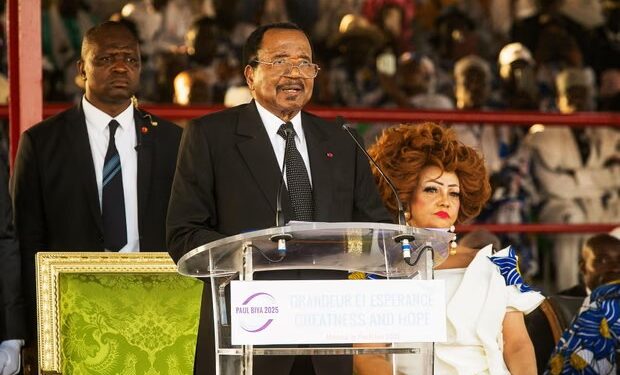Cameroon’s long-serving president, Paul Biya, is poised to seek yet another term as the Central African nation heads to the polls. At 92, Biya remains one of the world’s oldest and longest-ruling leaders, having first assumed power in 1982. Despite growing calls for political renewal, his party appears determined to extend his rule.
A lifetime in power
Biya’s more than four decades in office have defined Cameroon’s political landscape. Initially seen as a stabilising force after the country’s post-colonial turbulence, his presidency has increasingly been marked by authoritarian control, limited press freedom, and a lack of viable opposition. The ruling Cameroon People’s Democratic Movement (CPDM) continues to dominate political life through a vast patronage network and tight control of state institutions.
Concerns over health and transparency
In recent years, Biya has rarely appeared in public, fuelling speculation about his health and fitness to govern. Government officials insist that he remains “in excellent shape,” but his prolonged absences from domestic affairs have prompted unease among citizens and diplomats alike. Critics argue that the state functions largely through loyal aides and a close circle of security and political advisers rather than direct presidential leadership.
Election dynamics and opposition challenges
As polling day approaches, opposition groups have struggled to mount a unified challenge. Figures such as Maurice Kamto of the Cameroon Renaissance Movement have denounced what they describe as systematic restrictions, including limits on campaigning, media coverage, and voter registration. International observers have also voiced concerns over fairness and transparency, citing Cameroon’s history of disputed elections and low voter confidence.
A nation divided and weary
Beyond the capital, deep divisions persist. The ongoing conflict in the Anglophone regions continues to displace thousands, while economic challenges and youth unemployment remain acute. Many younger voters have grown disillusioned with what they view as a stagnant political system resistant to change. Yet, Biya’s government maintains that continuity is essential for stability in a volatile region.
What lies ahead
If re-elected, Biya would surpass 45 years in power by the end of his new term, placing him among the longest-serving heads of state in modern history. For many Cameroonians, the election poses a stark choice between the familiarity of the old order and the uncertainty of transition. Regardless of the outcome, the vote is likely to shape the country’s political direction for years to come.
Newshub Editorial in Africa – 14 October 2025Cameroon’s long-serving president, Paul Biya, is poised to seek yet another term as the Central African nation heads to the polls. At 92, Biya remains one of the world’s oldest and longest-ruling leaders, having first assumed power in 1982. Despite growing calls for political renewal, his party appears determined to extend his rule.
A lifetime in power
Biya’s more than four decades in office have defined Cameroon’s political landscape. Initially seen as a stabilising force after the country’s post-colonial turbulence, his presidency has increasingly been marked by authoritarian control, limited press freedom, and a lack of viable opposition. The ruling Cameroon People’s Democratic Movement (CPDM) continues to dominate political life through a vast patronage network and tight control of state institutions.
Concerns over health and transparency
In recent years, Biya has rarely appeared in public, fuelling speculation about his health and fitness to govern. Government officials insist that he remains “in excellent shape,” but his prolonged absences from domestic affairs have prompted unease among citizens and diplomats alike. Critics argue that the state functions largely through loyal aides and a close circle of security and political advisers rather than direct presidential leadership.
Election dynamics and opposition challenges
As polling day approaches, opposition groups have struggled to mount a unified challenge. Figures such as Maurice Kamto of the Cameroon Renaissance Movement have denounced what they describe as systematic restrictions, including limits on campaigning, media coverage, and voter registration. International observers have also voiced concerns over fairness and transparency, citing Cameroon’s history of disputed elections and low voter confidence.
A nation divided and weary
Beyond the capital, deep divisions persist. The ongoing conflict in the Anglophone regions continues to displace thousands, while economic challenges and youth unemployment remain acute. Many younger voters have grown disillusioned with what they view as a stagnant political system resistant to change. Yet, Biya’s government maintains that continuity is essential for stability in a volatile region.
What lies ahead
If re-elected, Biya would surpass 45 years in power by the end of his new term, placing him among the longest-serving heads of state in modern history. For many Cameroonians, the election poses a stark choice between the familiarity of the old order and the uncertainty of transition. Regardless of the outcome, the vote is likely to shape the country’s political direction for years to come.
Newshub Editorial in Africa – 14 October 2025



Recent Comments